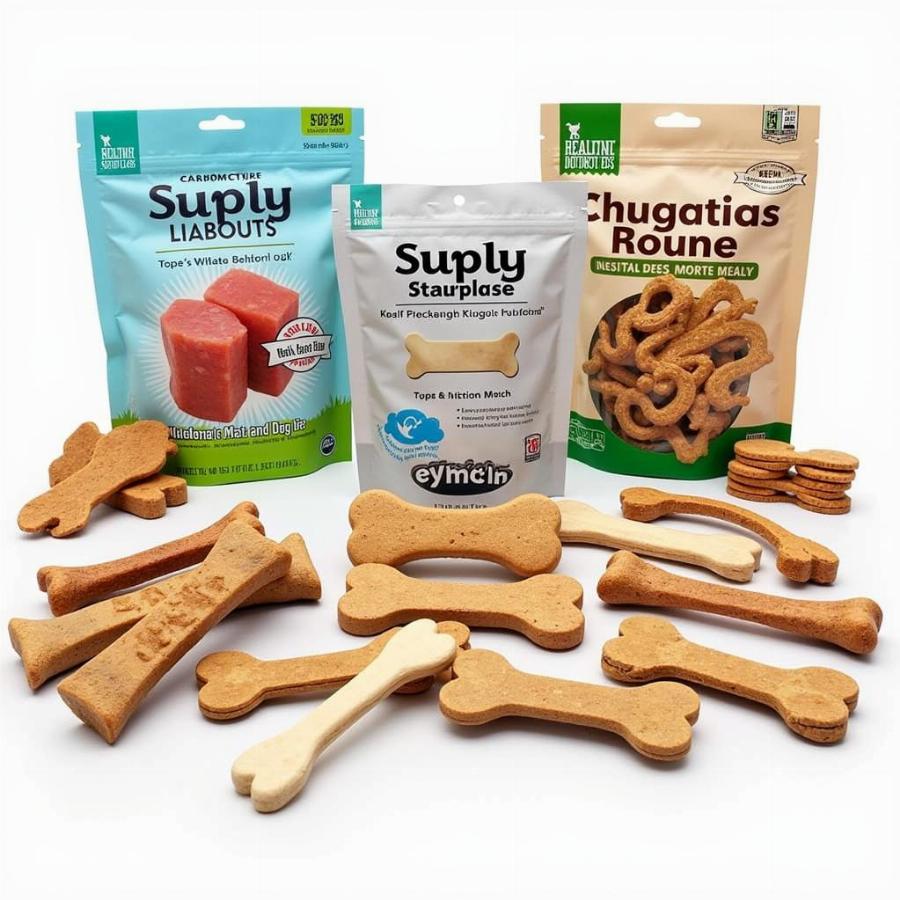Tuna in water is a common pantry staple, and you might be tempted to share a bit with your furry friend. But is it safe for dogs to eat tuna in water? The short answer is: in moderation. While tuna itself isn’t toxic to dogs, feeding it regularly or in large quantities can lead to health issues. This article will delve into the benefits and risks of feeding your dog tuna in water, helping you make informed decisions about your canine companion’s diet.
Understanding the Nutritional Value of Tuna for Dogs
Tuna does offer some nutritional benefits for dogs. It’s a good source of protein, essential fatty acids like omega-3s, and certain vitamins and minerals. Omega-3 fatty acids can contribute to a healthy coat, reduce inflammation, and support cognitive function. However, these benefits can be obtained from other, safer sources specifically designed for canine consumption.
Potential Risks of Feeding Tuna to Dogs
While occasional small amounts of tuna in water are unlikely to cause significant harm, there are several potential risks associated with feeding tuna to dogs regularly or in large quantities.
Mercury Poisoning
Tuna, especially larger species like albacore, can contain high levels of mercury. This heavy metal can accumulate in a dog’s system over time, leading to mercury poisoning. Symptoms of mercury poisoning in dogs can include loss of coordination, tremors, blindness, and even kidney failure.
Selenium Toxicity
Tuna also contains selenium, a mineral that is beneficial in small amounts but can be toxic in high doses. Excessive selenium intake can cause gastrointestinal upset, hair loss, and neurological problems.
High Sodium Content
Canned tuna packed in water, while a healthier option than tuna packed in oil, can still contain a significant amount of sodium. Too much sodium can lead to dehydration, increased thirst, and potentially more serious health issues like high blood pressure.
Thiamine Deficiency
Regular consumption of raw fish, including tuna, can lead to a thiamine deficiency in dogs. Thiamine, also known as vitamin B1, is crucial for proper neurological function. A deficiency can cause loss of appetite, seizures, and even death.
How to Safely Feed Tuna to Your Dog (If at all)
If you choose to give your dog tuna, ensure it’s plain tuna canned in water, not oil. Drain the water thoroughly to reduce sodium content. Offer only a small amount as an occasional treat, and never make it a regular part of their diet. Always consult your veterinarian before introducing any new foods, especially if your dog has pre-existing health conditions.
Can Puppies Eat Tuna?
Puppies are particularly vulnerable to the negative effects of mercury and selenium. It’s best to avoid feeding tuna to puppies altogether. Focus on providing them with a complete and balanced puppy food formulated to meet their specific nutritional needs.
What Are Some Healthy Alternatives to Tuna for Dogs?
There are many healthy and safe alternatives to tuna that can provide your dog with the same nutritional benefits. Consider incorporating foods like salmon, sardines (packed in water), cooked chicken, or lean beef into their diet in moderation. These options are lower in mercury and offer a good source of protein and omega-3 fatty acids.
Can Dogs Eat Tuna in Brine?
Tuna packed in brine is even higher in sodium than tuna packed in water. It’s best to avoid feeding your dog tuna in brine altogether. The high sodium content can be detrimental to their health.
 Healthy Dog Treats
Healthy Dog Treats
What to Do If Your Dog Eats Too Much Tuna
If your dog accidentally consumes a large amount of tuna, contact your veterinarian immediately. They can advise you on the best course of action and monitor your dog for any signs of toxicity.
Conclusion
While a small amount of tuna in water occasionally won’t likely harm your dog, it’s best to err on the side of caution. The potential risks of mercury poisoning, selenium toxicity, and high sodium intake outweigh the limited benefits. Focus on providing your dog with a balanced diet formulated for their specific needs, and choose safer, healthier alternatives to tuna for occasional treats. can dogs eat tuna in water? Talk to your vet for personalized dietary advice.
FAQ
- Is tuna toxic to dogs? Tuna itself isn’t toxic, but the mercury content can be harmful in large quantities.
- Can dogs eat raw tuna? No, raw tuna can carry parasites and bacteria that can make your dog sick. It can also lead to a thiamine deficiency.
- How much tuna can I give my dog? If you choose to give your dog tuna, offer only a very small amount as an occasional treat.
- What are the signs of mercury poisoning in dogs? Loss of coordination, tremors, blindness, and kidney failure are potential signs.
- What are some healthy fish options for dogs? Salmon and sardines (packed in water) are good alternatives.
- Should I consult my vet before giving my dog tuna? Yes, always consult your veterinarian before introducing new foods to your dog’s diet.
- What should I do if my dog eats too much tuna? Contact your veterinarian immediately.
Do you have more questions about your dog’s diet? Check out these related articles:
Beaut Dogs is your trusted source for all things related to dog care, providing expert advice and valuable information on various breeds, health, nutrition, and training. For personalized support and detailed answers to your dog-related questions, feel free to reach out to us via Email: [email protected]. We’re here to help you provide the best possible care for your beloved canine companion. Beaut Dogs is dedicated to empowering dog owners with the knowledge and resources they need to ensure their furry friends live long, happy, and healthy lives. Visit us at https://beautdogs.com today.